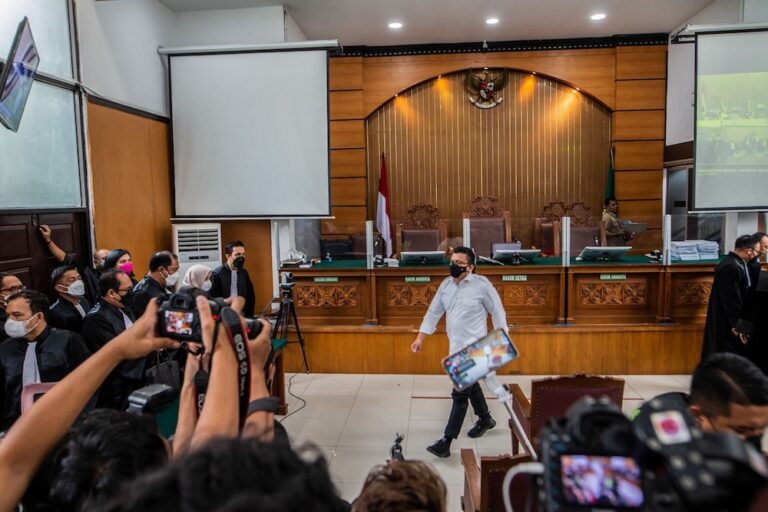(AJI/IFEX) – The following is a press release by the Southeast Asian Press Alliance (SEAPA) -Jakarta office, of which AJI is a member: WORLD PRESS FREEDOM DAY CELEBRATED IN INDONESIA President Abdurrahman Affirms Free Press Commitment JAKARTA, Indonesia, May 3 — President Abdurrahman Wahid reaffirmed his government’s commitment to protect the right of free expression […]
(AJI/IFEX) – The following is a press release by the Southeast Asian Press Alliance (SEAPA) -Jakarta office, of which AJI is a member:
WORLD PRESS FREEDOM DAY CELEBRATED IN INDONESIA
President Abdurrahman Affirms Free Press Commitment
JAKARTA, Indonesia, May 3 — President Abdurrahman Wahid reaffirmed his government’s commitment to protect the right of free expression during ceremonies held to celebrate World Press Freedom Day in Indonesia.
“My administration looks with relish on the emergence of a free press,” Abdurrahman said in remarks made at the beginning of a conference on Press Freedom in Southeast Asia, organized by the Southeast Asian Press Alliance (SEAPA) in cooperation with the United Nations Educational, Scientific and Cultural Organization (UNESCO).
The event in Jakarta, which included speakers from East Timor, Burma, Malaysia, Cambodia, Thailand and Indonesia, was the first time that UNESCO had held a World Press Freedom Day event in Indonesia. Organizers chose Indonesia in recognition of the openness of the Indonesian media since the resignation of former President Suharto in May 1998.
“I want to call attention to the fact that the Indonesian press needs protection as well as professionalism,” Abdurrahman said. “The government needs to protect the press from the many forces who don’t want freedom.”
Kavi Chongkittavorn, the chairman of SEAPA, congratulated Indonesia for its accomplishments toward the press and called on journalists in the region to work together to spread press freedom beyond the three “free press” countries of Southeast Asia, the Philippines, Thailand and Indonesia.
“In the past, outside assistance was pivotal to highlight the press abuses and any violation of freedom of expression in Southeast Asia,” said Kavi, who is also the executive editor of the Nation newspaper in Bangkok. “Now, with growing press freedom in the region, this responsibility has fallen on the regional press.”
Speakers at the conference noted ongoing severe press censorship in Burma and harsh press licensing laws in Malaysia. In addition, journalists in Indonesia still face frequent physical attacks from angry pressure groups throughout the country.
A delegation of East Timorese journalists spoke on the need to develop the press in the former Indonesian territory almost from scratch. Most of the press infrastructure in East Timor was destroyed by the pro-Indonesia militia violence that followed the referendum on independence held in the territory last September. The gathering was the first occasion in which East Timorese journalists have met publicly with their Indonesian colleagues since the referendum.
The UNESCO country representative for Indonesia, Professor Stephen Hill, read a United Nations statement on the occasion of World Press Freedom Day. “In every society, freedom of the press is essential to transparency, accountability, good governance and the rule of law,” the statement said. “It cannot be suppressed without dire consequences for social cohesion and stability.”
SEAPA, which is an alliance of free press organizations in Southeast Asia, was founded in November 1998. It recently opened an office to protect journalists’ rights in Indonesia and it has ongoing projects throughout the region.


